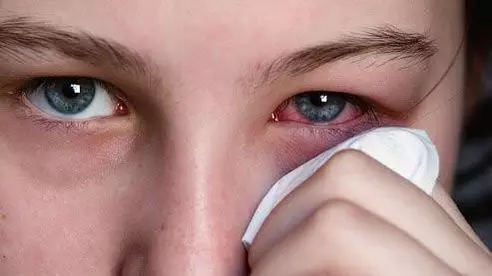Conjunctivitis outbreak: Eye drops, antibiotics go off shelves in Hyderabad
According to chemists, there is a shortage of eye drops, ointments, antibiotic and steroid-based eye drops, and ointments due to high demand and limited supply
By Anoushka Caroline Williams
Representational Image
Hyderabad: Chemists claim that there is a shortage of eye drops, ointments, antibiotics, and steroid-based eye drops due to high demand and limited supply.
Due to an increase in conjunctivitis occurrences across the state, the worst-affected Hyderabad districts are experiencing a severe scarcity of antibiotic eye drops and ointments.
Patients with conjunctivitis are typically offered anti-allergic and anti-inflammatory eye drops. However, because they are unable to supply the need for such treatments, the city's pharmacists report that demand has skyrocketed.
According to chemists, there is a shortage of eye drops, ointments, antibiotic and steroid-based eye drops, and ointments due to high demand and limited supply.
Tobramycin, moxifloxacin, ciprofloxacin, chloramphenicol, ciprofloxacin D, and flurbiprofen are among the eye drops in low supply. Aciclovir, chloramphenicol, ganciclovir, and steroid (dexamethasone) eye ointments are in low supply.
"The shortage of eye drops and ointments is due to a sudden increase in demand and limited supply. Some brands are in high demand and are in short supply. However, messages on social media are causing individuals to fear, and they are racing to pharmacies to get medications with certain names. The situation is expected to improve in the next few days." said Ophthalmologist Dr. Shikha Fogla.
Shortage of facilities at Sarojini Devi Eye Hospital
Conjunctivitis cases have increased by thousands in the city.
However, the victims who sought therapy are experiencing challenges. Patients have voiced their dissatisfaction with the lack of amenities at Sarojini Devi Eye Hospital in Hyderabad.
In addition to a scarcity of doctors who can administer therapy, people must wait in queues to receive medication. Since the hospital administration did not take any preventative precautions, the victims were forced to congregate in one location.
Because there is only one counter available to distribute medicines, there is no way to take medicine unless one is willing to wait over two hours in the queue.
Shortage in Pharmacies
According to chemists, there has been a significant increase in the number of conjunctivitis cases, which was not witnessed on such a large scale during the epidemic.
"Whatever stock we had was exhausted, and there was no supply from stockists. We've placed the order, but we don't know when the eye drops will be available," said Avinash Sen, a pharmacist from Hyderabad's Humayun Nagar.
According to a medicine distributor, even though at least ten kinds of eye drops are available, firms are unable to supply the increased demand. There is also a scarcity of steroid eye drops, which are being recommended to many patients for a speedier recovery.
"In some areas, the infection has spread to the point where one out of every four people visiting our outlet requests an eye drop." We've been out of stock for the past two days. "Our other counter in Badambadi is also in a similar situation," said another chemist, Soumya Ranjan Nayak.
Not only are antibiotic and steroid eye drops in low supply, but so is chloromycetin applicap, an antibiotic that kills germs. Ophthalmologists have warned that improper use of such medication may cause greater harm in the long run. They also advised against using steroid drops since they cause serious corneal damage.
Doctors Advice
"It takes time for antibiotic eye drops to work, but they do not harm the eye. If taken without seeing a doctor, steroid eye drops can cause significant cornea damage. If antibiotic drops are administered needlessly, there is also a danger of antibiotic resistance afterward," ophthalmologist Dr. Prashanth Gupta said.
According to Dr. Mallika Goyal, an ophthalmologist at Apollo Hospital, not all patients with conjunctivitis infection require medications to recover, and in most cases, the patients heal on their own.
"Good hygiene and isolation post-infection must be strictly adhered to. In the event of a suspected illness, citizens should avoid using over-the-counter medications and eye drops. We encourage citizens to seek medical advice before using any eye drops or ointments. Conjunctivitis treatment is free at PMC-run hospitals," she remarked.
Conjunctivitis, often known as pink eye, is an infection or inflammation of the Conjunctiva, a translucent membrane that covers the white area of the eyeball. Infection with Adenovirus, the group of viruses that causes the common cold and other upper respiratory infections, is the most common cause of conjunctivitis.